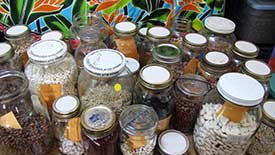This is the first of an ongoing series with Dr. Alan Kapuler, founder of Peace Seeds, and former co-founder and research director for Seeds of Change. He currently resides in Corvallis, Oregon where he continues his research projects, and maintains his remarkable Peace Seedlings organic seed catalog.
Alan Kapuler is a man who thinks on big time scales, and across wide geographic spheres of reality.
A molecular biologist by training, as a young adult, Kapuler experienced an almost spiritual connection from working with plants. Years later, he became a public domain organic plant breeder, and an impassioned advocate for the protection of the natural world. Kapuler believes, the interconnectedness of all living things—biodiversity itself, is the true seed of life. Widely regarded as the founding father of the organic seed movement, Kapuler’s reverence of living things is embodied in his daily work—planting, breeding, and cataloging of seeds he has done for almost 40 years.
“It used to be that public domain plant breeding was done in the agricultural universities,” Kapuler explains, “where the schools would hire people interested to make crops for the local area so the local self sufficiency was enhanced, and so there was more diversity in the local food system. That’s broken down. The only place that’s really left is the government, in the Germ Plasm Resource Information Network (GRIN) where you can actually get online and find interesting seeds, and they will send them to you if you want to do plant breeding for the benefit of humanity.”
Sadly today, it’s more about developing and protecting patent rights on plants and seeds, than serving society’s needs. As a scientist involved in helping to develop biotechnology, Kapuler does not see genetic engineering as inherently evil. It’s a powerful tool that can be used for the public good, but as he sees it, ownership rights, and the patenting of life, limit its potential. For the most part, this technology has brought us, the BT toxin and roundup ready traits in plants; he believes, we can do so much better than this. Kapuler asks, how come we can’t use genetic engineering to develop plants that grow in the ocean, or avocadoes that grow on temperate zone conifers?
One of Kapuler’s keen interests is studying of the world’s flora to better understand the genetic relationships of plants. So when he grows a garden, the question, how much diversity am I really planting, can be properly answered. Over the years, Kapuler has grown hundreds, even thousands of different plant species, and through the various seed companies he has run, he has offered over 1200 kinds of seeds, most collected from his gardens.
“The garden is a metaphor for having a place to develop an ethical way to understand life, and to make a life that is ethical,” says Kapuler.
Watch the full interview series
- Alan Kapuler: Man of Science, Ideas, and Humanity
- Alan Kapuler: Man of Science, Ideas, and Humanity-2
- Alan Kapuler: Man of Science, Ideas, and Humanity-3
- Alan Kapuler: Man of Science, Ideas, and Humanity-4
Most of the videos featured on Cooking Up a Story were produced, filmed, and edited by Rebecca Gerendasy. Fred Gerendasy contributed as a writer to many of the posts and occasionally as the interviewer. Visit Rebecca Gerendasy Clay – Art and Fred Gerendasy Photography to see their current work.

